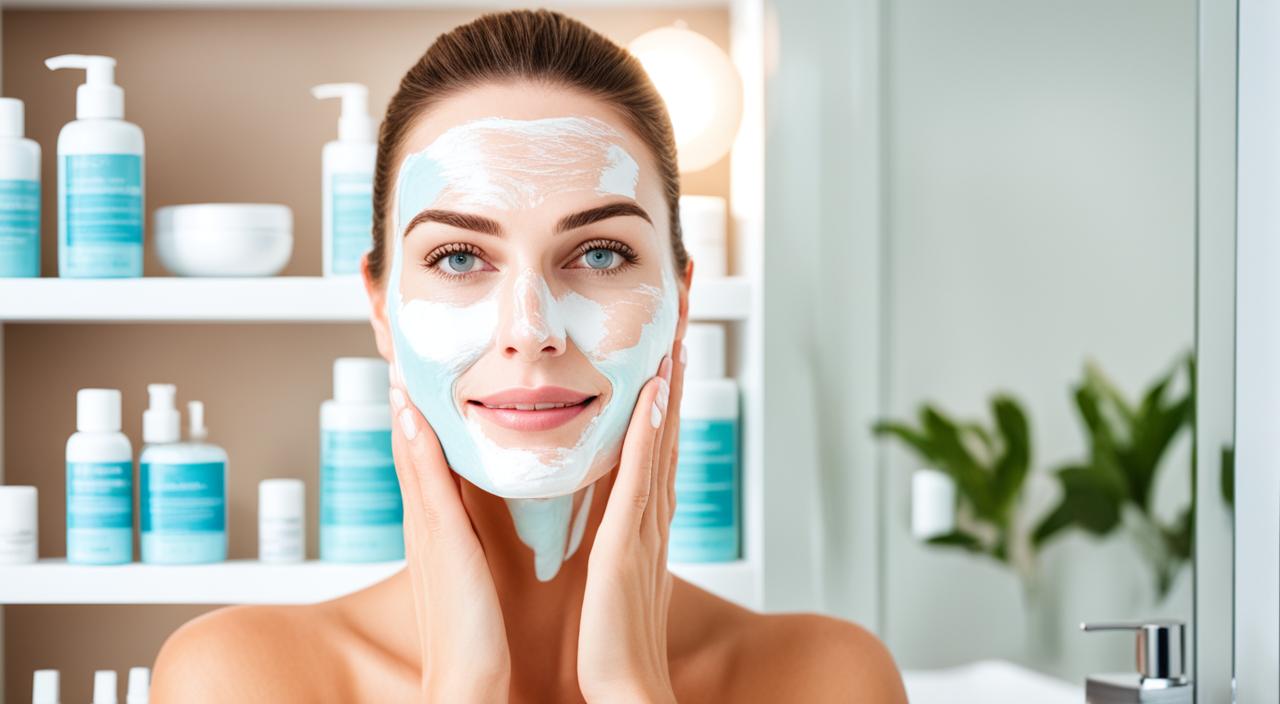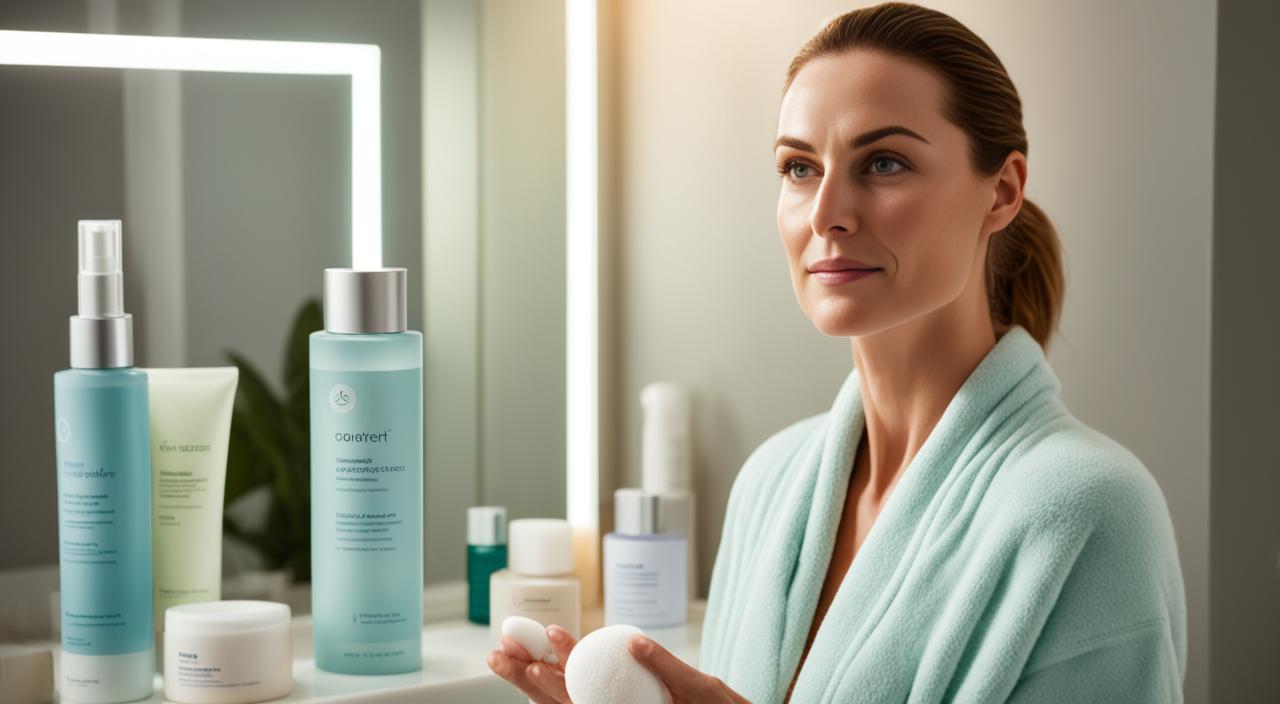Expert Tips For Glowing Skin All Year Round
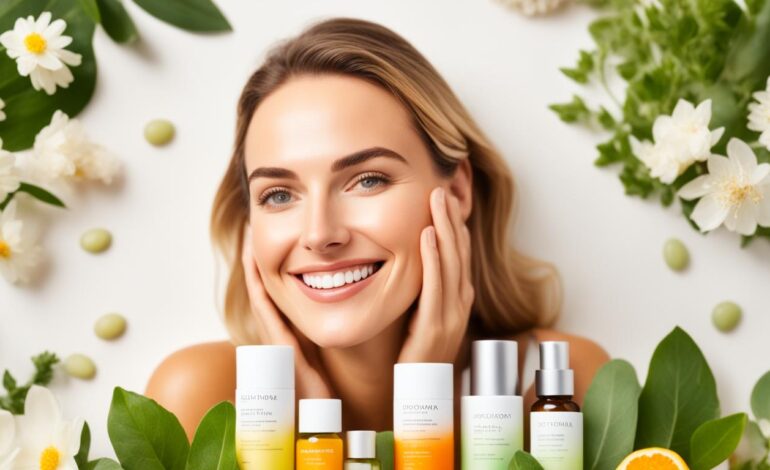
Tips For Glowing Skin : Achieving glowing skin is a goal for many, and it is certainly attainable with the right skincare routine and lifestyle habits. If you want to enhance your complexion and maintain a radiant glow all year round, follow these expert tips.
Key Takeaways:
- Follow a consistent skincare routine for glowing skin
- Protect your skin from harmful UV rays with daily sun protection
- Hydrate your skin with products containing hyaluronic acid
- Incorporate antioxidant-rich foods into your diet for a healthy complexion
- Regularly exfoliate to remove dead skin cells and reveal brighter skin
Importance of Sun Protection for Glowing Skin
Daily sun protection is crucial for maintaining healthy and glowing skin. The harmful UV rays emitted by the sun can cause extensive damage to the skin, leading to premature aging, dark spots, and even skin cancer. Therefore, it is essential to incorporate effective sun protection into your daily skincare routine.
One of the most important products to use is sunscreen. Look for a broad-spectrum sunscreen that protects against both UVA and UVB rays. The sun protection factor (SPF) of the sunscreen determines its ability to shield your skin from harmful UV radiation. Experts recommend using a sunscreen with at least SPF 30.
Applying sunscreen should be a non-negotiable step in your skincare routine, regardless of the season. UV rays can penetrate clouds and windows, making it necessary to protect your skin all year round. Even during the winter months, when the sun may not feel as intense, UV rays can still cause damage to your skin.
The Power of Broad-Spectrum Protection
“Using a broad-spectrum sunscreen is crucial to protect your skin from both UVA and UVB rays. UVA rays are responsible for premature aging, while UVB rays can cause sunburn. It’s important to choose a sunscreen that provides broad-spectrum protection to shield your skin from both types of rays.”
Broad-spectrum protection ensures that your skin is shielded from UVA and UVB rays, providing comprehensive defense against sun damage. UVA rays penetrate deep into the skin and contribute to wrinkles and sunspots, while UVB rays primarily affect the outer layers of the skin, causing sunburns. By using a broad-spectrum sunscreen, you can prevent both types of damage.
Remember to apply sunscreen generously and reapply every two hours, or more frequently if you are sweating or in water. Additionally, consider wearing protective clothing, like wide-brimmed hats and long sleeves, and seeking shade during peak sun hours (usually between 10 am and 4 pm).
Protecting your skin from harmful UV rays is crucial for maintaining a radiant complexion. Make sunscreen with broad-spectrum protection and at least SPF 30 a non-negotiable step in your daily skincare routine. By prioritizing sun protection, you can prevent sun damage, premature aging, and maintain healthy, glowing skin.
Hyaluronic Acid for Hydrated and Glowing Skin
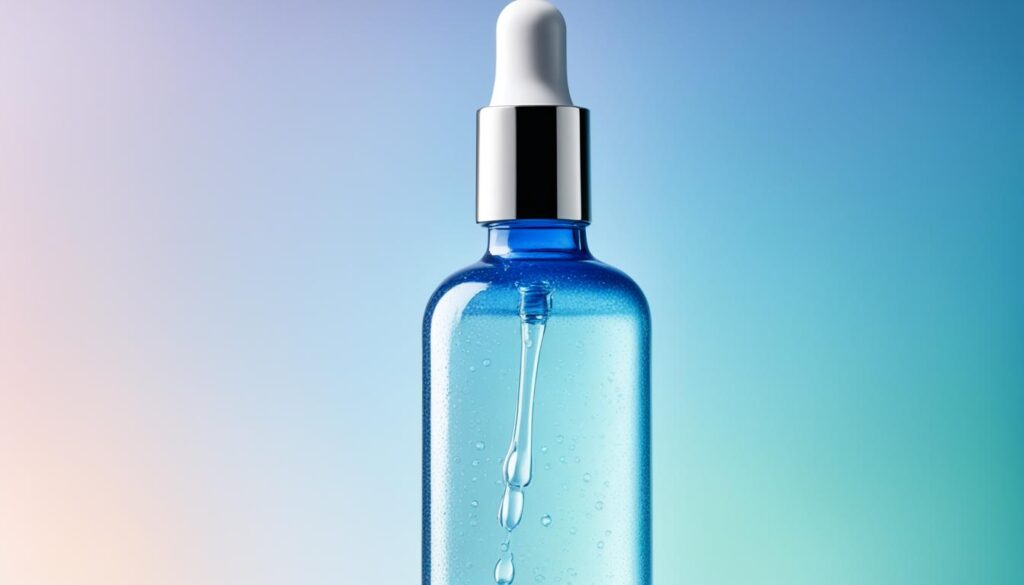
Hyaluronic acid is a must-have ingredient for achieving and maintaining hydrated and glowing skin. Its powerful moisturizing properties make it a popular choice in skincare products such as moisturizers and serums. When applied topically, hyaluronic acid acts as a humectant, attracting and retaining moisture in the skin.
By enhancing hydration levels, hyaluronic acid helps to improve the overall appearance of the skin, creating a more supple and plump complexion. It is particularly beneficial for individuals with dry or dehydrated skin, as it boosts water retention and prevents moisture loss.
One of the key advantages of hyaluronic acid is its ability to penetrate the skin deeply, reaching the dermis where it can promote collagen synthesis. This collagen-boosting effect helps to improve skin elasticity and firmness, revealing a more youthful and radiant appearance.
When searching for skincare products that contain hyaluronic acid, look for formulations specifically labeled as moisturizers or serums. These products are designed to deliver potent hydration and maximize the benefits of hyaluronic acid for the skin.
“Hyaluronic acid is like a hydration hero for the skin. It helps to replenish moisture, improve skin texture, and restore radiance.”
Whether you choose a moisturizer or serum, incorporating hyaluronic acid into your skincare routine can provide significant benefits for your skin’s overall health and appearance. Make sure to follow the product instructions for optimal use and consider consulting with a dermatologist for personalized recommendations.
Benefits of Hyaluronic Acid for the Skin
| Benefits | Explanation |
|---|---|
| Hydration | Hyaluronic acid attracts and retains moisture in the skin, promoting hydration. |
| Improved Skin Texture | By enhancing moisture levels, hyaluronic acid helps to smooth and soften the skin’s texture. |
| Collagen Synthesis | Hyaluronic acid stimulates collagen production, improving skin elasticity and firmness. |
| Radiant Appearance | Proper hydration and moisturization from hyaluronic acid can result in a glowing and healthy-looking complexion. |
Tips for Using Hyaluronic Acid:
- Apply hyaluronic acid products to clean, damp skin for optimal absorption.
- Follow up with a moisturizer to seal in the hyaluronic acid and provide additional hydration.
- Consider layering hyaluronic acid products if your skin needs an extra boost of moisture.
- Use hyaluronic acid both in your morning and evening skincare routine for consistent hydration.
By incorporating hyaluronic acid into your skincare routine, you can enhance hydration, improve skin texture, and achieve a radiant and glowing complexion.
Nutritional Tips for Glowing Skin

A healthy diet plays a significant role in achieving glowing skin. Incorporate antioxidant-rich foods such as grapes, berries, and nuts into your diet. Additionally, stay hydrated by drinking plenty of water throughout the day to maintain a glowing complexion.
Antioxidant-rich foods are packed with vitamins and minerals that nourish your skin from within. Grapes, berries, and nuts are excellent sources of antioxidants, which help fight free radicals and promote skin health. Including these foods in your diet can enhance your skin’s natural radiance.
Did you know?
Berries, such as blueberries, strawberries, and raspberries, are not only delicious but also contain high levels of antioxidants, which can protect your skin against damage caused by environmental factors like pollution and UV radiation.
In addition to antioxidant-rich foods, proper hydration is essential for maintaining glowing skin. Drinking an adequate amount of water helps keep your skin hydrated and plump, reducing the appearance of dryness and dullness. Aim to drink at least eight glasses of water per day to support optimal skin health and achieve a radiant complexion.
Hydration is key for healthy-looking skin. When your body is properly hydrated, it improves blood circulation, which helps deliver essential nutrients and oxygen to your skin cells. This contributes to a glowing complexion and helps prevent dryness and flakiness.
Tips for Incorporating Antioxidant-Rich Foods and Hydration into Your Routine
- Add a handful of berries to your morning cereal or yogurt for a nutritious and delicious start to your day.
- Snack on a handful of nuts, such as almonds or walnuts, between meals to boost your intake of antioxidants.
- Keep a water bottle with you throughout the day to remind yourself to stay hydrated. Try infusing water with fruits or herbs for added flavor.
- Include hydrating fruits like watermelon and cucumbers in your meal plan to increase your water intake.
By incorporating antioxidant-rich foods and prioritizing hydration in your daily routine, you can support your skin’s natural glow and achieve a radiant complexion.
Exfoliation for Brighter Skin
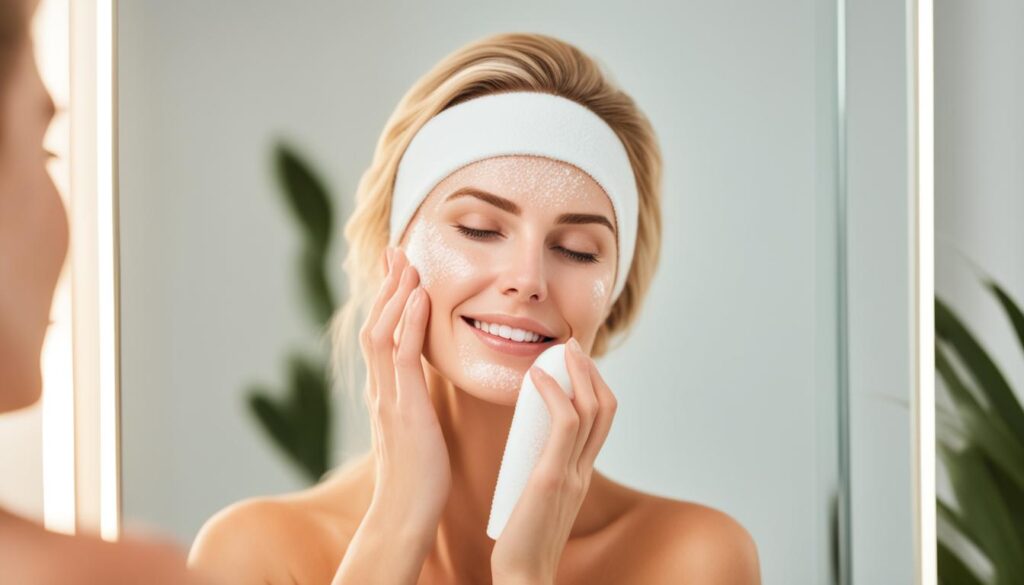
Regular exfoliation is essential for maintaining a healthy and radiant complexion. This process involves removing dead skin cells from the surface of the skin, revealing a brighter and more youthful glow. There are two main types of exfoliants that you can incorporate into your skincare routine: face scrubs and chemical exfoliants.
The Benefits of Face Scrubs
Face scrubs, also known as physical exfoliants, contain small particles that physically scrub away dead skin cells when massaged onto the skin. These scrub particles can be made from natural substances such as sugar, salt, or ground coffee, or they can be synthetic. When using a face scrub, it’s important to choose one with gentle exfoliating particles to avoid damaging or irritating your skin.
Chemical Exfoliants for a Gentle Approach
Chemical exfoliants, on the other hand, use ingredients such as alpha-hydroxy acids (AHAs) or beta-hydroxy acids (BHAs) to remove dead skin cells. These ingredients work by breaking down the bonds between the dead skin cells, allowing them to be easily shed from the skin’s surface. Chemical exfoliants are a great option for those with sensitive skin or those who prefer a gentler approach to exfoliation.
Expert Tip: When using chemical exfoliants, it’s important to start with a lower concentration and gradually increase it to avoid any potential irritation.
Incorporating Exfoliation into Your Routine
To achieve the best results, exfoliate your skin a few times a week. If you have oily or acne-prone skin, you may benefit from more frequent exfoliation. However, if you have dry or sensitive skin, it’s important to be mindful of over-exfoliating, as this can lead to irritation.
Here’s a simple guide on how to incorporate exfoliation into your skincare routine:
- Cleanse your face with a gentle cleanser.
- Apply a small amount of your chosen face scrub or chemical exfoliant to your fingertips.
- Gently massage the exfoliant onto damp skin using circular motions, focusing on areas that are prone to dryness or congestion.
- Rinse off thoroughly with lukewarm water.
- Follow with your regular skincare routine, including moisturizer and sunscreen.
By regularly exfoliating your skin, you can improve its texture, minimize the appearance of pores, and enhance its overall glow. Remember to listen to your skin’s needs and adjust the frequency of exfoliation accordingly for the best results.
The Power of Vitamin C for Radiant Skin

Vitamin C is a potent ingredient that can work wonders for your skin. Its brightening properties can revitalize your complexion, leaving it looking radiant and glowing. Adding skincare products containing vitamin C to your daily routine can boost collagen production, fade dark spots, and protect your skin from free radicals.
One of the key benefits of vitamin C is its ability to enhance collagen production. Collagen is a protein that helps maintain the structure and elasticity of your skin. As we age, collagen production naturally declines, leading to the appearance of fine lines and wrinkles. By incorporating vitamin C into your skincare regimen, you can stimulate collagen synthesis, resulting in plumper, smoother skin.
In addition to promoting collagen production, vitamin C is also effective in fading dark spots and pigmentation. Dark spots, also known as hyperpigmentation, can be caused by various factors, including sun exposure, hormonal changes, and acne scarring. Vitamin C’s brightening properties can help to lighten these dark spots, giving your skin a more even tone.
Furthermore, vitamin C is packed with antioxidants, which play a vital role in protecting your skin from environmental damage. Antioxidants help to neutralize free radicals, which are unstable molecules that can cause oxidative stress and accelerate the aging process. By incorporating vitamin C into your skincare routine, you can provide your skin with an extra layer of defense against these harmful free radicals.
To incorporate vitamin C into your skincare routine, look for products such as serums, moisturizers, and face masks that contain this powerful ingredient. Apply these products after cleansing and toning your skin, allowing them to penetrate deeply and work their magic. Remember to follow up with a broad-spectrum sunscreen to protect your skin from UV damage.
Healthy Skincare Practices for Glowing Skin

Consistent skincare practices are essential for maintaining a glowing complexion. By following a few key steps, you can keep your skin healthy and radiant. Here are some healthy skincare practices to incorporate into your daily routine:
Cleansing
Proper cleansing is the foundation of any skincare routine. Use a gentle cleanser suited for your skin type to remove dirt, oil, and impurities. Cleansing your face twice a day, in the morning and evening, will help keep your skin clean and fresh.
Moisturizing
Moisturizing is crucial for keeping your skin hydrated and nourished. Choose a moisturizer that suits your skin type and apply it after cleansing. Regular moisturization helps maintain a healthy moisture barrier and prevents dryness, leading to a glowing complexion.
Face Masks
Face masks can provide an extra boost of hydration and nutrients to your skin. Incorporate face masks into your weekly skincare routine to target specific concerns such as dryness, dullness, or acne. Look for masks that contain ingredients like hyaluronic acid, antioxidants, or natural extracts, depending on your skin’s needs.
Facial Massage
A relaxing facial massage can improve blood circulation and promote lymphatic drainage, giving your skin a healthy glow. Use gentle, upward strokes and circular motions while applying your moisturizer or facial oil. This massage technique helps enhance product absorption and relax facial muscles.
The Use of Highlighters
Highlighters can be a game-changer when it comes to achieving a radiant complexion. Apply a liquid or powder highlighter to the high points of your face, such as the cheekbones, brow bone, and cupid’s bow. This technique adds a luminous sheen and enhances your skin’s natural radiance.
| Skincare Practice | Benefits |
|---|---|
| Cleansing | Removes impurities and keeps skin clean |
| Moisturizing | Hydrates and nourishes the skin for a healthy glow |
| Face Masks | Provides hydration and targets specific skin concerns |
| Facial Massage | Improves blood circulation and enhances product absorption |
| The Use of Highlighters | Adds a luminous sheen and enhances natural radiance |
The Benefits of Self-Tanning for a Natural Glow

If you’re looking for a way to achieve a natural-looking, sun-kissed glow without the harmful effects of the sun, self-tanners are the perfect solution. Self-tanners provide a safe and convenient alternative to traditional tanning methods. By using a self-tanner specifically formulated for the face and body, you can achieve a beautiful, natural-looking tan that lasts for days.
To ensure a flawless application and a smooth, streak-free finish, it’s important to follow a few simple steps. Start by exfoliating your skin to remove any dead cells and create a smooth canvas. Next, apply the self-tanner evenly, making sure to blend it well into your skin. For best results, apply the self-tanner before bed and allow it to develop overnight. By morning, you’ll wake up to a fully developed, natural-looking tan.
If you want to enhance the glow on your body even further, consider using bronzing powder or body shimmer. These products can add depth and radiance to your tan, giving your skin a beautiful luminosity. Whether you’re heading to the beach or simply want to achieve a healthy-looking glow, self-tanners combined with bronzing powder or body shimmer are the ultimate tools for creating a natural, sun-kissed complexion.
Benefits of Self-Tanning:
Self-tanners offer several benefits that make them a popular choice among individuals seeking a natural-looking tan:
- Safe alternative: Self-tanning provides a safe alternative to sun exposure or tanning beds, which can contribute to skin damage and premature aging.
- Customizable shade: With a wide range of self-tanning products available, you can choose a shade that matches your skin tone or opt for a gradual formula for a more subtle tan.
- Long-lasting: Self-tanners typically last for several days, allowing you to maintain your tan without frequent reapplication.
- Even application: Self-tanners can be applied evenly and effortlessly, resulting in a streak-free finish when following the correct application techniques.
- Convenience: Self-tanners offer the convenience of achieving a natural-looking tan in the comfort of your own home, without the need for extended sun exposure.
Embrace the benefits of self-tanning to achieve a beautiful, natural-looking glow that enhances your complexion and boosts your confidence.
Tips for Enhancing Glow with Makeup

Makeup can play a role in enhancing your skin’s glow. By using the right products and techniques, you can achieve a radiant complexion that looks effortlessly luminous. Here are some tips to help you enhance your skin’s natural radiance with makeup:
1. Use a Liquid Highlighter:
A liquid highlighter is a must-have product for adding a touch of luminosity to your complexion. Apply it to the high points of your face, such as the cheekbones, brow bones, and the bridge of the nose. The liquid formula blends seamlessly into the skin, giving you a beautiful, natural-looking glow.
2. Opt for Spot Concealer:
Instead of using a heavy foundation that can mask your skin’s natural radiance, opt for spot concealer. Use it to cover any imperfections or blemishes while allowing your skin to shine through. Spot concealer provides targeted coverage, giving you a fresh and natural glow.
3. Enhance Your Skin’s Dimension with Bronzer:
Strategically applying bronzer can add depth and dimension to your complexion, enhancing your skin’s radiance. Use a bronzer that complements your skin tone and apply it to areas where the sun naturally hits your face, such as the forehead, temples, and the apples of your cheeks.
By following these tips, you can use makeup to enhance your skin’s glow and achieve a radiant, luminous complexion.
Conclusion
In conclusion, achieving glowing skin is not just about using the right skincare products, but also about adopting healthy lifestyle habits. A consistent skincare routine that includes cleansing, moisturizing, exfoliation, and protection from the sun’s harmful UV rays is crucial for maintaining a natural radiance.
However, skincare alone is not enough. Healthy habits, such as eating a nutritious diet rich in antioxidant foods, staying hydrated, and getting enough sleep, play a significant role in enhancing your skin’s glow. Incorporating these habits into your daily routine can have a positive impact on your overall skin health.
Remember, skincare is a journey, and it’s important to be patient and consistent in your efforts. By following expert tips and incorporating these healthy habits, you can enjoy a glowing complexion all year round and feel confident in your skin’s natural radiance.
Also Refer : 10 Easy DIY Fixes For Dry Skin At Home
FAQs
Q: What are some tips for maintaining healthy and glowing skin all year round?
A: To maintain healthy and glowing skin throughout the year, you should follow a consistent skincare routine, use sunscreen daily, stay hydrated, eat a balanced diet, get enough sleep, and avoid smoking and excessive alcohol consumption.
Q: How can I determine my skin type?
A: You can determine your skin type by observing how it feels and looks throughout the day. Dry skin feels tight and may appear flaky, oily skin looks shiny and is prone to breakouts, combination skin experiences both dryness and oiliness in different areas, and normal skin feels balanced and not overly oily or dry.
Q: What are the benefits of using a serum in my skincare routine?
A: Serums are formulated with high concentrations of active ingredients that can target specific skin concerns such as hydration, brightening, or anti-aging. They can penetrate deeply into the skin and provide noticeable improvements when used consistently.
Q: How often should I exfoliate my skin?
A: The frequency of exfoliation depends on your skin type. Those with oily or acne-prone skin may benefit from exfoliating 2-3 times per week, while individuals with dry or sensitive skin should limit exfoliation to once a week to avoid irritation.
Q: Why is it important to protect the skin barrier?
A: The skin barrier, or the outermost layer of the skin, acts as a protective shield against environmental stressors and helps retain moisture. Protecting the skin barrier is essential for maintaining healthy and resilient skin.
Q: What are some home remedies for achieving glowing skin?
A: Home remedies for glowing skin may include using ingredients like honey, yogurt, turmeric, aloe vera, and coconut oil. These natural ingredients can help nourish and rejuvenate the skin, promoting a healthy glow.
Q: How does sunscreen help in achieving and maintaining glowing skin?
A: Sunscreen protects the skin from harmful UV rays, which can cause premature aging, dark spots, and skin cancer. By applying sunscreen daily, you can prevent sun damage and maintain a youthful and radiant complexion.
Q: What role do antioxidants play in skincare?
A: Antioxidants help protect the skin from oxidative stress caused by free radicals. They can neutralize damaging molecules and support the skin’s natural repair processes, promoting overall skin health and radiance.
Q: What is the best way to wash your face for clear and glowing skin?
A: To wash your face for clear and glowing skin, use a gentle cleanser suited for your skin type, lather with lukewarm water, and massage in a circular motion. Rinse thoroughly and pat your skin dry with a clean towel.
Q: When should I consult a dermatologist for skincare concerns?
A: If you have persistent skin issues, unexplained changes in your skin, or are unsure about the best skincare approach for your specific needs, it’s advisable to schedule an appointment with a dermatologist who can provide personalized recommendations and treatments.




